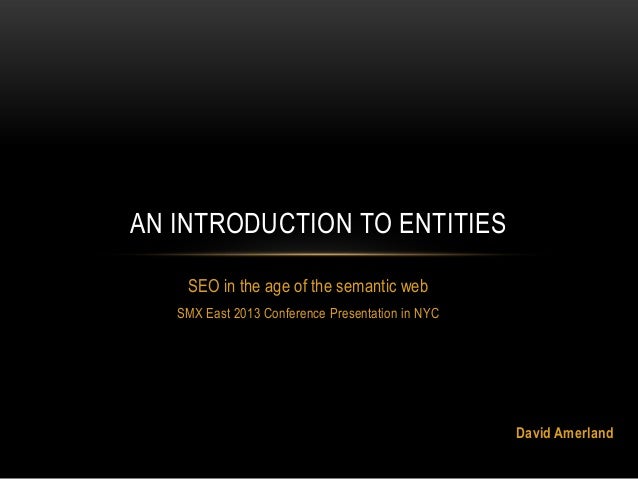Everybody hates spammers so much that almost every website has a
CAPTCHA box of some kind in its interactive pages. It makes sense, but
it’s annoying. In its attempt to make it as hard as possible for bots to
circumvent, some CAPTCHA is hard even for humans to get right the first
time and then, when you refresh, depending on the fields you have
filled out, you may have to start again.
It all really flies against what we want the web to be: accessible,
and easy to use. It also illustrates the fight between legit web users
and spammers who simply clog up with low-value content whatever channel
they happen to get access to.
In a semantic web, of course, spammers have about as much place as snake oil salesmen have in the real world.
The semantic web revolves around entities and entities require a large number of signals to help define them.

This means that as semantic search matures and the semantic web
begins to take shape we will see less and less of untoward behavior
because it will be ineffective, counterproductive to marketing and less
possible due to lack of anonymity.
I have written before on how search engines can discover who you are in the
semantic web and how even on Twitter Google can put together the fragments of your
identity.
The latest announcement on Google’s security blog that CAPTCHA now has
been reduced to a single “I am not a Robot” click
http://googleonlinesecurity.blogspot.de/2014/12/are-you-robot-introducing-no-captcha.html
is an indication of how well Google can track your activity across the
web even down to individual mouse movements when you’re on a website.
Identity vs Privacy
Welcome as this may be from a marketing point of view it will also
raise concerns that perhaps, here is another case of Google invading
online users’ privacy. Vinay Shet, the product manager for Google’s
CAPTCHA team has clarified that what Google does is basically “
verify your humanity” rather than your identity.
It’s All About Semantic Search
In case you did not realise it, of course, this is all about semantic
search. The ability to identify entities and humans on their way to
acquiring entity-status in Google’s index, is key to establishing the
Veracity element in the 4Vs of semantic search (Volume, Velocity,
Variety and Veracity).
That will have tremendous impact on the reliability of breaking news
and items of interest showing up in search and will go some way to
stopping nonsense posts like the recent “Who is the King of the US?”
query which, for all its novelty, tends to undermine the confidence we
have in Google answers to search queries.
The Marketing ‘Thing’
The question here is “what does this mean for me?” as a webmaster or
marketer. Well, the call for keeping your marketing “real” based around
the triumvirate of Trust, Authority and Reputation has been going at
least since
Google Semantic Search was published. If you have not quite been “getting” the message then my piece on How “Keeping It Real” became the next
Big Thing in Marketing written for the Plus Your Business website or Mark Traphagen’s excellent post on
Why Your Brand Should Be Represented by Real People might help.
Really the things you should be doing now are all driven by the need for “data density” in the semantic web:
- Cross-link all your digital accounts
- Post content that reflects your personal values
- Project your personality in everything you do
- Find an audience, do not market to the ‘masses’
- Engage with those you find, discover who they are
- Provide value, don’t just sell
The year ahead is going to see an increasing number of changes
happening across the web as semantic technologies will require more and
more personal signals in order to function correctly.
Without making light of the concerns our headlong speed into this
unknown are causing there should also be a lot of excitement. Value, in
the strictest sense of the word, can finally begin to trump hype. “Being
Real” is better than marketing personas. And being honest in your
marketing finally makes real business sense.
Additional Links
Google Can Tell You’re Not a Robot (Wired)
reCAPTCHA just got easier (but only if you’re human)
Are you a robot? Introducing “No CAPTCHA reCAPTCHA”
Google Offers Easier Way to Prove You’re Not a Robot (WSJ)
Discussion on a Better CAPTCHA (Sitepoint)
This article was previously published on
davidamerland.com by
David Amerland








No comments:
Post a Comment
Thanks For Your Kind Opinion. I'll replay you soon. Stay Connected. Cheer! :)